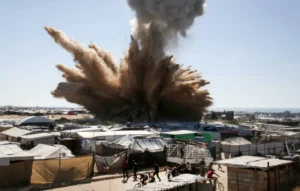Israel’s war on Gaza: Why do legal experts say it’s genocide?

People flee after an Israeli strike hits camp for displaced Palestinians in northern Khan Yunis, southern Gaza, in April 2025
Sondos Asem writes in Middle East Eye on 14 August 2025:
Is Israel committing genocide in Gaza? It’s a question that has been asked repeatedly since Israel declared war on the Palestinian enclave on 7 October 2023 after Hamas-led attacks on southern Israel killed around 1,200 people.
To date, more than 60,000 Palestinians have been killed, and the population of 2.2 million displaced repeatedly.
The territory’s infrastructure and services have been reduced to rubble. Israel has blocked aid, including food, water and medical supplies. There has been international condemnation amid scenes of starvation.
The word “genocide” is frequently used in discussions about Gaza. But it’s important to understand that it is defined in international law, that it is recognised by courts globally, and that perpetrators can be held accountable.
For academics and experts, whose life’s work is the study of genocide, the consensus has grown that Israel has passed the point of committing genocide in Gaza. But there is division as to when.
Some, such as academic Raz Segal, identified it as starting in October 2023, describing Israel’s military campaign as a “textbook case of genocide”.
Others put the date later: Holocaust scholar Omer Bartov reached the same conclusion in May 2024, when the scale and intensity of the destruction became impossible to ignore.
And for British sociologist and scholar Martin Shaw, genocide began in 1948 and the Nakba, the mass displacement and killing of Palestinians that established the state of Israel.
This divergence has sparked academic tensions. Palestinian human rights lawyer and international law scholar Nimer Sultany says that the evidence was “overwhelming from the start” and has criticised academics who reached the conclusion months into the war.
His views echo broader frustration among Palestinian scholars, who say that the slow pace of recognition reflects a double standard in how genocide is identified.
Middle East Eye has interviewed legal experts throughout the war and at length (much of the content can be found at the international law section or the Expert Witness podcast series). Below, we look at what experts have said about Israel and genocide, and how they reached their conclusions. First, some essentials.
What is the definition of genocide?
Genocide is widely recognised as “the crime of crimes”. It is legally defined in the Genocide Convention (1948), as well as the Rome Statute of the International Criminal Court (1998).
Article I says that genocide is a crime under international law, which the states parties to the convention “undertake to prevent and to punish.”
Article II states that “genocide means any of the following acts committed with intent to destroy, in whole or in part, a national, ethnical, racial or religious group”. There then follows a list:
